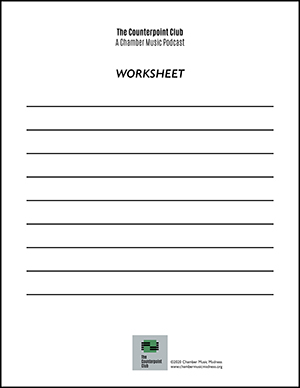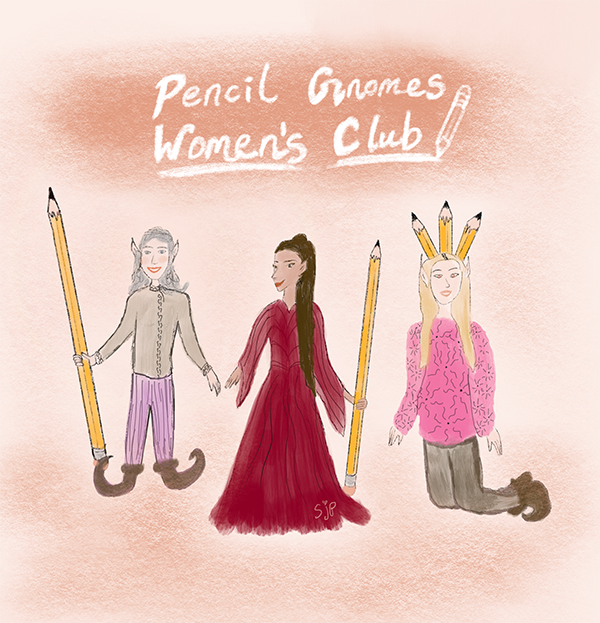In Opus 2 Episode 5, Skyros talks about the influence of women in chamber music as well as more broadly in classical music. In the history portion of the podcast, Sarah discusses the unique way in which chamber music has provided a creative outlet for women to both compose and perform, while highlighting some trailblazing female composers and performers like Fanny Mendelssohn and Maud Powell. In the technique portion, Willie guides us through the four steps that Skyros Quartet uses to help us incorporate more diverse musical voices into our repertoire, and to top it all off, Sarah interviews the internationally-acclaimed composer, Dr. Kaley Lane Eaton, who is Interim Professor of Composition, Voice, and Music Technology at the Cornish College of the Arts in Seattle, Washington.

Women have always created music, but only a select few women were able to make their living as musicians in the past, and our knowledge about their lives and careers is limited. Documentation of women’s role in music is scarce and because the traditions and people important in Western art music are nearly exclusively chronicled by men, the contributions of women are largely disregarded, never published, rarely performed, and lost or forgotten.
Historically, upper class society encouraged women musicians as amateurs, but rarely as professionals. Those rare women who became professionals, prior to the late 19th century, were usually nuns in monasteries or part of the artisan class. The women in the artisan class belonged to families of musicians and artists, and they grew up training alongside their brothers. Some were able to break out into a career in music by relying on their family reputations to be accepted in the professional community. Even so, their options were much more limited than their male counterparts, and they faced great adversity.
Due to the unique nature of chamber music performance, which often took place within the household, chamber music provided an avenue for women to be involved as organizers, concert goers, performers, and composers.
During the lesson, Sarah mentions some of the women outliers in the past who were able to create and publish chamber music works. Here are musical examples from some of them:
11th Century: Hildegard von Bingen
16th Century: Maddalena Casulana
16th Century: Concerto delle donne di Ferrara
17th Century: Isabella Leonarda
18th Century: Maddalena Lombardini Sirmen
19th Century: Fanny Mendelssohn Hensel
20th Century: Maud Powell
21st Century: Joan Tower
And here is a link to Sarah’s dissertation: Virtuoso Violinist Maud Powell: Enduring Champion for American Women in Professional Music

 In the technique lesson, Willie outlines a step-by-step process you can use to incorporate more diversity into your repertoire.
In the technique lesson, Willie outlines a step-by-step process you can use to incorporate more diversity into your repertoire.
- Step 1: Commit – Commit to yourself to incorporate more diversity.
- Step 2: Research – Use online resources (see below for links) to discover repertoire that is new to you.
- Step 3: Program – Program this new repertoire in a thoughtful way that celebrates and centers the music you chose in step 2.
- Step 4: Perform – Practice, rehearse, and share this music with audiences in performance.
The worksheet for this episode provides a more detailed version of these steps.
In Step 2: Research, Willie highlights these three resources:
- Institute for Composer Diversity: Composer Diversity Database
A searchable database that allows you to search for composers by criteria such as living or deceased, woman, man, or non-binary, ethnic background, and country of residence. - The Philomel Project
A free database of solo and chamber works by women composers, searchable by type, instrumentation, language, and more. - Hildegard Publishing Company
A music publishing company that publishes only music by women, whose catalog currently has over 500 works in it, written by nearly 300 women from all eras of music history.
There are of course many other resources that can help with your research. Do you have a favorite that wasn’t mentioned here? Leave a link in a comment below!

Our special guest during this episode is Dr. Kaley Lane Eaton. We are grateful to have a colleague like her in our community!
 Dr.
Dr. Kaley Lane Eaton
A conservatory-trained classical pianist and vocalist who fell into creating electronic music shortly after a stint playing Baroque lute, Seattle composer Kaley Lane Eaton’s music is colored by this eclecticism, expressing a preoccupation with harmony, improvisation, storytelling, emotion, physical gesture, and vocal virtuosity. Her work has been performed across the US and internationally, in venues ranging from Hong Kong concert halls, to the streets of Skid Row in Los Angeles. Her “disconcertingly lovely” (Seattle Magazine) compositions are quickly gaining notoriety for combining innovative digital technology with ancient performance practices, questioning humanity’s growing dependence on technology and the resulting exploitation of human connection.
Eaton’s work has garnered recent support from the Jack Straw Cultural Center (2020 Artist Support Program), ASCAP (2019 Plus Award), Seattle Office of Arts and Culture (2019 CityArtist Award), the Allied Arts Foundation (2018 Listen Up! Grants for Composers grantee), the International Alliance for Women in Music (2017 Pauline Oliveros New Genre prize for lily [bloom in my darkness]), the Hambidge Center for Creative Arts and Sciences (2017 Distinguished Holland and Knight Fellowship), the Atlantic Center for the Arts (2017 Associate Artist), and 4Culture (2017 Tech-Specific Grant). In 2019, her work BIG DATA for clarinet, string quartet, and 3D electronics was commissioned and premiered by Derek Bermel and the Seattle Symphony Orchestra as part of the inaugural season in the new Octave 9 space.
With flutist/composer Leanna Keith and violist/composer Heather Bentley, Eaton co-directs Kin of the Moon
As a writer with particular interest in the role of classical music to feminism, education, and our larger culture, Eaton has been published by KING FM’s Second Inversion (“Women, Creativity, and the Classroom” (2016)
Here is Kaley’s electroacoustic opera lily [bloom in darkness] for voice, live electronic processing, pulse sensors, viola, cello, clarinet, harp, and dance, with an original libretto by poet felicia klingenberg:
Do you have a favorite composition by a woman composer? Please share it with us in the comments!


Hi! Here is my recommendation for the string quartet I mentioned in the episode that I can’t stop listening to: The “Phantasy” String Quartet by Imogen Holst. It’s a fantastic piece! There is a great recording on Spotify, I’d highly encourage you to check it out!
https://open.spotify.com/album/6vZaLzkEDgBPgOacZjRJmP?si=7C_Xjv4VSsmky9DWyS9jvg
Do you have a favorite piece of chamber music by a woman? Please share with us here!